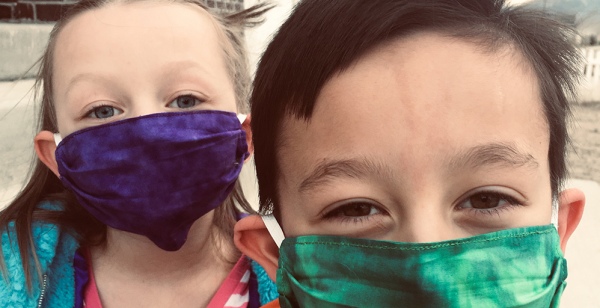latest
Mask Mandate Reaching Into Early Education in Massachusetts

By Matt Murphy
Consistent with the new mask-wearing rules in public schools, the Baker administration on Tuesday will seek permission to impose a mask mandate for all staff and children age 5 and older enrolled in state-licensed pre-kindergarten, after-school and other early education programs.
The policy would look similar to what Education Commissioner Jeff Riley rolled out last week for students, faculty and staff in K-12 public schools, which requires that anyone over the age of 5 must wear a mask regardless of vaccination status through at least Oct. 1.
The Board of Early Education and Care will hold a special meeting Tuesday morning to consider the request to give Commissioner Samantha Aigner-Treworgy the authority to implement the new masking policy in early education centers.
Aigner-Treworgy will also ask the board for the authority to modify educator qualifications and professional development requirements, and take other administrative measures that will make it easier to hire teachers and respond to a workforce shortage that is limiting families’ access to early education options, officials said.
“EEC is committed to addressing barriers to help child care programs increase their workforce and help more families get back to work by accessing child care that works for them,” Aigner-Treworgy said in a statement. “We fully recognize the critical importance of doing all we can to help mitigate the impact of the pandemic on child care and on the health and safety of families.”
The policy, if approved, would require adults in EEC facilities to be masked at all times, unless outside, including parents at pick-up and drop-off. The EEC policy bulletin notes that by federal public health order, all children over the age of 2 and staff are required to wear masks on child care transportation.
The administration also said children age 2 to 4 who can “safely and appropriately wear, remove, and handle face masks” should be “strongly encouraged” to wear one. No students would be required to wear a mask while eating or sleeping, and exemptions would be available for physical and behavioral health conditions that might make wearing a mask unsafe.
“Implementing masking requirements, providing PPE, and encouraging vaccination are important measures to keep young children, their families, and caregivers healthy,” Education Secretary James Peyser said.
The Board of Elementary and Secondary Education voted 9-1 last week to allow Riley to impose an indoor school mask mandate for students, teachers and staff, regardless of vaccination status, though the public school order only runs through Oct. 1 for now, when middle and high schools may be able to lift the requirements if they have a at least an 80 percent vaccination rate.
The EEC policy, as drafted, would take effect Sept. 7 and does not appear to have an expiration date or vaccination rate trigger to relax the mask requirements. EEC says the commissioner “will revise the EEC mask requirement as warranted by public health data, in coordination with the Department of Public Health.”
Vaccines are not currently available for children under 12.
While the Department of Early Education and Care does not track enrollment or the ages of children participating in early education programs, the administration said that as of June 6 there were 209,102 slots at licensed facilities across the state.
In addition to center and family-based day care programs, the policy will apply to licensed after-school programs run for children age 5 through 13 at community facilities like the YMCA.
“We’re happy to see EEC is responding and giving clarity to the early education and care field that’s working so hard every day to ensure smooth transitions for students and families,” said Amy O’Leary, the Early Education for All campaign director at Strategies for Children.
Child care centers can already request mobile vaccination services, and EEC-licensed programs can order personal protective equipment through the state and have it delivered at no cost.
Free drive-through COVID-19 testing also continues to be available for the early education sector, and weekly pooled testing programs for staff, educators and children are being offered through Neighborhood Villages, with funding from EEC.
In addition to the masking rule, Aigner-Treworgy plans to seek permission to make it easier for early education programs to hire teachers, citing “significant workforce challenges” across the sector.
The commissioner will present her full plan to the board at its Sept. 14 meeting, according to officials, but her recommendations could include steps such as utilizing early childhood continuing education units in place of credit courses, and finding other ways to be flexible with respect to experience requirements to increase hiring.
The high volume of employers seeking workers and the unpredictability of enrollment trends as COVID-19 infection rates have waxed and waned have made hiring in early education settings a challenge, according to people involved in the industry.
The availability of new federal aid is expected to help the situation at many programs, with $314 million available through the American Rescue Plan Act. That funding began to go out to EEC programs last Friday.
-

 Community6 years ago
Community6 years agoNational Shrine of La Salette Festival of Lights 2017 set to begin
-

 Community6 years ago
Community6 years agoMassachusetts State Police looking for good home for retired dogs
-

 Crime6 years ago
Crime6 years agoFall River ranked most dangerous city in Massachusetts according to report
-

 latest6 years ago
latest6 years agoDurfee student allegedly overdoses on marijuana
-

 Community6 years ago
Community6 years agoVideo of Fall River Police goes viral
-

 Causes6 years ago
Causes6 years agoMissing Fall River woman found deceased
-

 Crime6 years ago
Crime6 years agoFall River Police add names to most wanted list
-

 Causes6 years ago
Causes6 years agoFall River teenager reported missing has been found



